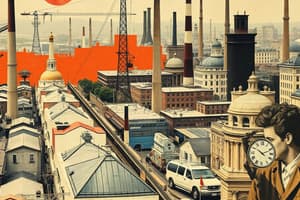Podcast
Questions and Answers
What was one of the most significant consequences of industrialization on society?
What was one of the most significant consequences of industrialization on society?
- Shift from a rural, agrarian existence to an urban society (correct)
- Improved access to clean water and sanitation
- Transition from urban to rural living
- Rise in agricultural employment opportunities
What type of jobs were many people relegated to in the industrial centers?
What type of jobs were many people relegated to in the industrial centers?
- Highly skilled managerial positions
- Innovative research and development roles
- Creative artistic occupations
- Low-skilled, repetitive jobs (correct)
What challenges arose due to the shift from rural to urban living during industrialization?
What challenges arose due to the shift from rural to urban living during industrialization?
- Enhanced access to healthcare facilities
- Inadequate housing and poor sanitation (correct)
- Expansion of educational opportunities
- Increased job satisfaction
How did the Industrial Revolution impact workers' empowerment?
How did the Industrial Revolution impact workers' empowerment?
Which factor contributed to the creation of dire conditions within crowded cities during industrialization?
Which factor contributed to the creation of dire conditions within crowded cities during industrialization?
What was a significant social change brought about by industrialization?
What was a significant social change brought about by industrialization?
How did the emergence of trade unions and political movements impact society during the Industrial Revolution?
How did the emergence of trade unions and political movements impact society during the Industrial Revolution?
What was one of the criticisms of industrialization according to the text?
What was one of the criticisms of industrialization according to the text?
How did the emergence of new social classes impact society during the Industrial Revolution?
How did the emergence of new social classes impact society during the Industrial Revolution?
What effect did industrialization have on cultural values according to the text?
What effect did industrialization have on cultural values according to the text?
Study Notes
Transforming Society: The Impact of Industrialization on Social Changes
The Industrial Revolution, a period of profound transformation that began in the 18th century, initiated a sweeping restructuring of global societies. This epochal shift in human history brought about significant social changes, shaping the world we inhabit today.
One of the most far-reaching consequences of industrialization was the transition from a rural, agrarian existence to an urban society. As factories and mills sprang up, vast numbers of people left farmlands to seek employment in the burgeoning industrial centers. This mass migration proved a double-edged sword, creating new opportunities for workers but also resulting in dire conditions within the crowded cities.
As people migrated to cities, they were often relegated to low-skilled, repetitive jobs, such as threading machinery in the textile industry, where they might work for 16 hours or more per day, earning little. Moreover, the shift from rural to urban living brought new challenges, such as inadequate housing, poor sanitation, and limited access to clean water, resulting in disease and squalor.
Despite the hardships, the Industrial Revolution also fostered new patterns of social interaction and empowerment. As workers began to organize, they gained a stronger voice in their communities and the labor market. The emergence of trade unions and political movements, such as the Progressive Movement, aimed to improve working conditions, wages, and access to public services.
The labor force itself underwent significant changes, as workers transitioned from being independent craftsmen to machine operators. This newfound specialization and division of labor, which was a hallmark of the factory system, ultimately led to increased productivity and economic growth.
As industrialization gained momentum, new social classes emerged, with the rise of the middle class and the decline of the landed gentry. The creation of new wealth also brought about a shift in cultural values, as confidence in mankind's ability to master nature grew.
These changes were not without their critics, however. Many feared the depersonalizing effects of mass production and considered the social costs of industrialization to be too high. Nonetheless, the Industrial Revolution set the stage for the world as we know it, shaping the social, economic, and technological landscapes of the 21st century.
In conclusion, the social changes brought about by industrialization were both transformative and challenging. As the world moved from a rural to an urban society, new opportunities and new challenges arose, paving the way for the modern era. The Industrial Revolution stands as a testament to the power of human creativity and perseverance, shaping the course of history and leaving an indelible mark on the world.
Studying That Suits You
Use AI to generate personalized quizzes and flashcards to suit your learning preferences.
Description
Explore how the Industrial Revolution reshaped societies through urbanization, new social classes, labor changes, and cultural shifts. Learn about the challenges and opportunities that stemmed from industrialization and how it paved the way for modern society.




